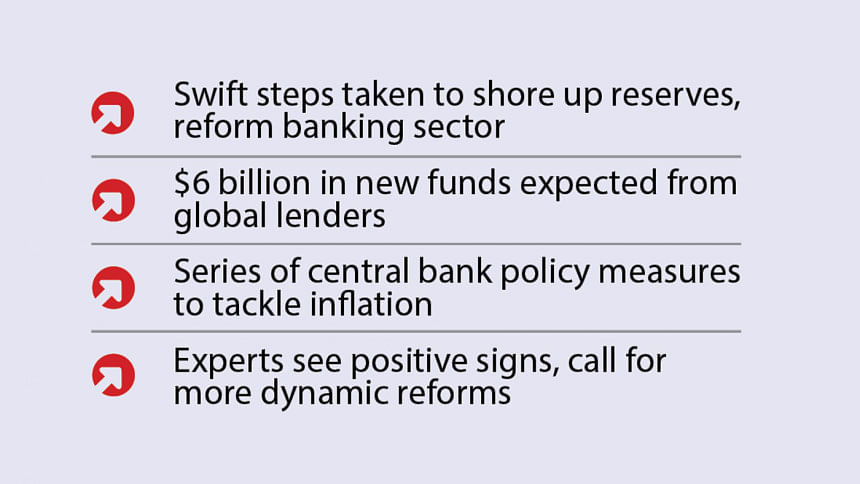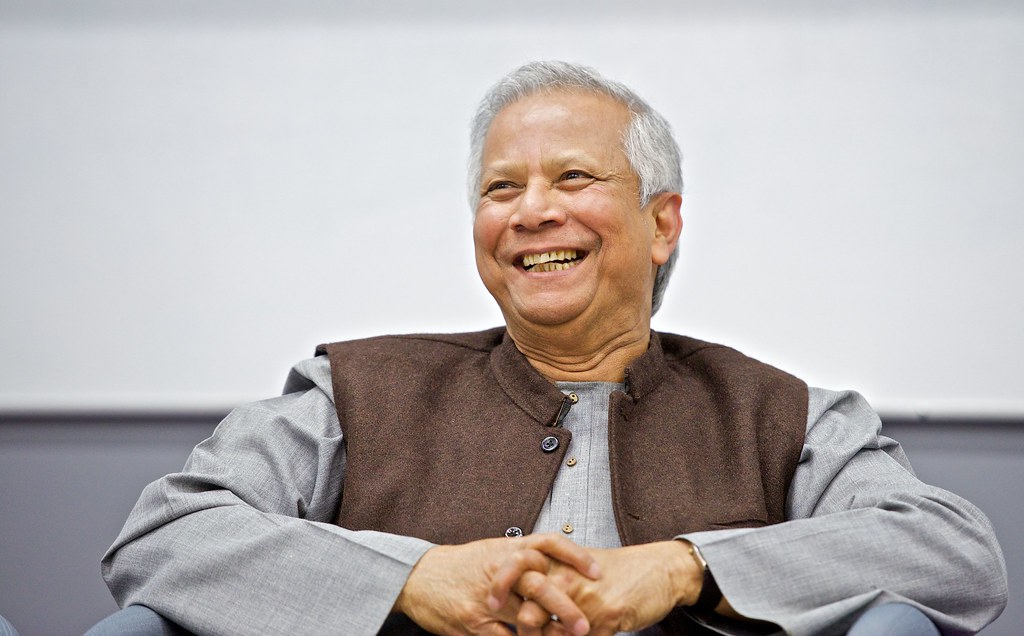Yunus’ economic gambit paying off
Two months ago, as Professor Muhammad Yunus waded into Bangladesh’s unprecedented political turmoil, he inherited economic chaos by default.
The interim government led by the Nobel Peace Prize winner stared into an economic outlook darkened by double-digit inflation, massive capital flight, shrinking reserves and a heavily strained banking system – a legacy left behind by Sheikh Hasina’s regime. Prof Yunus’ team wasted no time and took swift steps to rebuild reserves, reform the banking sector and retrieve bad loans. It strived to balance immediate interventions with long-term plans to ensure economic recovery and stability.

As reserves dwindled to a dangerous level, Bangladesh appealed to global lenders for help, securing a clear commitment from the International Monetary Fund to stand by the nation and fast-track fresh loans. The authorities now expect as much as $6 billion in new funds from global lenders, a badly needed lifeline that will ease pressure on reserves.
Bangladesh has been grappling with persistently high inflation for years, consistently exceeding 10 percent. This prolonged inflationary pressure is placing a significant burden on middle- and low-income groups, as well as marginalised communities. In response, Bangladesh Bank Governor Ahsan H Mansur, appointed by Yunus, implemented a series of policy measures aimed at tackling inflation. These actions included halting the printing of money for government loans, raising the policy interest rate, and rationalising public spending to create a balance between fiscal and monetary policies.
While these measures are timely, it will take some time for inflationary pressures to ease, according to Abdur Razzaque, chairman of Research and Policy Integration for Development (RAPID).
The banking sector is facing a critical liquidity crisis, exacerbated by bad loans resulting from politically motivated lending and the looting that occurred when state-backed individuals took control of banks. This situation poses a significant challenge for the new government.
At the end of 2023, the country’s distressed loans, a sum of non-performing loans, rescheduled loans and restructured write-offs, stood over Tk 4.75 lakh crore, which was 32 percent of the total outstanding bank loans and close to the operating expenditure of the 2023-24 national budget.
The actual amount of such loans will be much more if the latest situations are considered, said Selim Raihan, executive director of the South Asian Network on Economic Modeling (SANEM). He also feared that a large portion of these distressed loans may not be recoverable. “This is the biggest concern,” he said.
Since Mansur took over as the chief of Bangladesh Bank, the central bank reconstituted the boards of 11 beleaguered banks, mostly controlled by S Alam Group owner Mohammed Saiful Alam, who took away more than Tk 1 lakh crore from various lenders. Bangladesh Bank has also taken a stance not to provide direct liquidity support to the crisis-hit banks and facilitated interbank liquidity support from wealthy banks to ill lenders.
The new central bank governor moved to correct the corrupted banking sector and went after some financial hooligans who were closely pampered and indulged by the Awami League regime for doing any misdeeds they wished for, said Biru Paksha Paul, professor of economics at the State University of New York.
In addition, Bangladesh Bank has formed several task forces to assess the financial health of banks, find ways to resolve their crises, recover bad loans, and repatriate laundered money.
However, Paul said the central bank governor does not have the magisterial powers to punish the wrongdoers. “Similar efforts from the law and home ministries are missing. Now economic reforms do not mean academic discourse on economic laws because this is not a decent economy.”
Khondaker Golam Moazzem, research director at the Centre for Policy Dialogue (CPD), thinks more dynamic reforms are needed considering the gravity of challenges in recovering bad loans. Even though taskforces have been formed, it is not clear yet what types of initiatives have been taken to recover these loans, he added.
While banking sector reform, bad loan recovery, and inflation control depend on the government’s strength and capability, increasing eroding reserves—crucial for covering import bills—requires effective policy measures. The central bank has already implemented strategies to encourage remittance inflows by providing incentives for remittance earners to use formal channels and halting dollar lending from reserves. This approach has resulted in an impressive 80 percent year-on-year increase in remittances for September, with receipts reaching $2.4 billion, up from $2.2 billion in August.
According to RAPID Chairman Abdur Razzaque, noteworthy efforts are being made to address the foreign reserve crisis, including discontinuing the sale of dollars from reserves, reducing the exchange rate gap between banks and curb markets—likely exacerbated by money laundering linked to corruption—encouraging migrants to send remittances through formal channels, and securing soft loans and budget support from bilateral and multilateral partners. “Export performance has been sluggish due to weak demand for apparel in key markets such as the US and Germany. However, as exports recover and mirror the dynamism seen in remittances, the reserve situation should improve,” he added.
CPD Research Director Moazzem noted that while the outcomes of many initiatives have yet to become evident, there are positive signs, such as a degree of stability in the exchange rate and growth in remittance receipts. “However, we have yet to see any sign of increasing foreign exchange reserve, which is hovering near $20 billion,” he added.
The central bank has planned to establish a banking commission to establish good governance in the banking sector and oversee reforms, but it could not make it happen in the last two months of its journey. According to Moazzem, the government should take immediate steps to this end.
Despite all efforts, regaining depositors’ trust—the most critical asset for lenders—will be challenging for the central bank. This trust has been severely eroded by rampant corruption in the sector, which has put at least 10 banks on the brink of collapse. However, Abdur Razzaque hopes that with the current high interest rates, savers are being encouraged to deposit more, as reflected in the growth of deposits. This should help restore much-needed confidence in the system, especially in the aftermath of the massive mismanagement at several banks, he added.
Moazzem further said despite those initiatives in the banking sector, no step has been taken for the liquidation of some crisis-hit banks as the excessive number of banks is hampering the market competitiveness.
Selim Raihan hoped that those who were given the responsibility to oversee the banking sector would find a way out to create a pathway for the banking sector. However, it is not possible to bring a positive change by the only efforts of a few individuals like Mansur, if the whole bureaucratic system of the government mechanism is not functional, Raihan said.
While multiple measures have been initiated in the banking sector, the efforts in other sectors remain largely invisible. However, the formation of a committee led by renowned economist Debapriya Bhattacharya to prepare a white paper assessing the economic damage of the past 15 years is a significant step forward.
The country’s stock market has been severely affected by rampant corruption during Hasina’s regime. Its regulator, the Bangladesh Securities and Exchange Commission, is slowly waking up. It formed a five-member task force mainly to increase the confidence of investors and ensure good governance in the stock market. The SEC imposed a fine of Tk 428.52 crore on five companies and four individuals for manipulating the prices of Beximco shares, an unprecedented penalty in the country’s capital market.
In an effort to ensure tax compliance, the government blocked the transfer of shares of seven corporate giants that thrived under the Awami League government. The companies are Bashundhara Group, Orion Group, Summit Group, Beximco Group, S Alam Group, Nassa Group, and Third Wave Technologies, now Nagad Ltd.
But the interim government seems to be falling short of public expectations on broader economic reforms. It has formed six reform commissions which are focused on having an acceptable election, but strong reforms for the economy are required, Birupaksha Paul said.
He said the government’s first job will be to correct the cancer and bring all financial hooligans to justice. And its next steps will follow academic exercises on the economy such as — fair competition, job creation for the youths who are at the root of this change, controlling inflation, making market-based interest and exchange rates, recovery of defaulted loans, imposing taxes on those who can pay to improve revenues, correct the capital market and finally bring the semblance of speedy governance in the financial sector, Paul also said.
“As challenges in revenue collection persist, we’ve seen some initiatives from NBR, such as automation. However, major initiatives, like strengthening the financial audit system, are still lacking,” said Moazzem. He noted that the finance adviser has suggested revising the budget to reduce the allocation of Tk 1 lakh crore for the less import-dependent sector, but this has not yet been implemented. Moazzem believes that more dynamic reforms are necessary given the severity of challenges in these areas.
However, according to Moazzem, initiatives in the financial sector are adequate, compared to other sectors, but the results of those initiatives have not been visible till now as they require more time.
“We want to measure the success of these initiatives using three indicators: reducing inflation to 5-6 percent, achieving an exchange rate of Tk 90 per dollar, and lowering interest rates to single digits. Additionally, a significant reduction in defaulted loans is essential,” he added.
Zahid Hussain, former lead economist at the World Bank’s Dhaka office, commented that it is too early to assess the initiatives of the current interim government, noting that more time is needed to evaluate their outcomes.
LondonGBDESK//



Comments are closed.